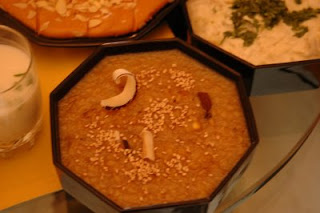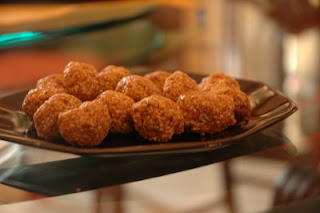
Makar sankranti is also known as kite’s day. It is celebrated on 14th January every year. It is the day when according to the Hindu astronomy the sun enters the rashi (zodiac) of Makara (Capricorn). It is a holiday when every family can be meet outdoors 'cutting' each other's kites. This immensely popular kite flying festival is held in all the important cities of Gujarat. A plethora of designer kites are also put on display. People surrender themselves to the joy of kite flying.
The sky-since morning to evening-remains dotted with vivid splashes of colour The excitement does not end with nightfall, which is the time for illuminated box kites, often in a series strung on one line, to be launched into the sky. Called "tukkals", they add a touch of splendour to the dark sky.
The International Kite Festival is always held in Ahmedabad, to coincide with the festival of Makar Sankranti. It is a joyous day, with a bright sun, clear skies and breezes strong enough to lift innumerable kites aloft. It is in fact a celebration to mark the end of winter, when the heat of summer is still to come. Kites are flown all over Gujarat, and Ahmedabad and Baroda become cities of kite-flyers, when all other work is forgotten and cares are put aside for the morrow. Besides the primary kite flying, the participants and spectators at the festival can also enjoy the cuisine and the crafts of the state. To be in any one of these places during this festival is to feel the heart and pulse of Gujarat and its people.
People of all ages gather on terraces or rooftops and engage in kite flying. There is music in the air and traditional delicacies are especially prepared for this day.
One of the sidelights of the festival is the Patang Bazaar, which is open 24 hours a day in the heart of Ahmedabad during the Makar Sankranti week. A visit to this bazaar in the middle of the night proves beyond all doubt that the entire population of the city is obsessed with patangs and they crowd the streets and buy their stocks while haggling and enjoying through the night.

Special traditional food is eaten, usually in the open field or a park, or in the garden of one's home. For those who needed food for sustenance, delectable dishes such as surati jaman, oondhiyu, kathiawadi bhanu, til chikki, khichada and others, typical of Gujarat, is served. Even for the religious, it is a time to rejoice, for it marks the movement of the sun into the Northern Hemisphere. The gods who are believed to have slumbered for six long months are now awake and the portals of heaven are thrown open. Devotees throng the temples of the city and distribute alms freely.

OONDHIYA
A classic Gujarati recipe.
Cooking Time : 60 mins.
Preparation Time : 30 mins.
Serves 6.
1/2 kg. Surti papdi
1/2 kg. purple yam (kand)
1/2 kg. yam (kand)
250 grams small potatoes
250 grams sweet potatoes (shakkariya)
250 grams small brinjals
3 bananas
1 recipe methi muthias
1 tablespoon carom seeds (ajwain)
2 teaspoons green chilli-ginger paste
1/4 teaspoon soda-bi-carb
To be ground into a masala
1/2 fresh coconut, grated
3/4 cup chopped coriander
1/2 cup green garlic, chopped
4 teaspoons coriander-cumin seed powder (dhana-jeera)
1 tablespoon green chilli-ginger paste
2 teaspoons chilli powder
4 teaspoons sugar
1 tablespoon lemon juice
salt to taste
For the tempering
1/4 teaspoon asafoetida (hing)
6 tablespoons oil
1. String the Surti papdi, taking care not to separate the 2 sides.
2. Wash the papdi, put the carom seeds, soda bi-carb and salt and mix well.
3. Peel the purple yam, yam and sweet potatoes and cut into big pieces.
4. Peel the potatoes.
5. Make a criss-cross slit in the potatoes and brinjals taking care not to separate the segments. Keep aside.
6. Cut the bananas into big pieces and cut a vertical slit in the centre of each piece.
7. Fill half the masala mixture into the slits of the potatoes, brinjals and bananas. Keep the remaining half for later use.
8. Heat the oil in a pressure cooker and add asafoetida.
9. Add the Surati papdi, potatoes, yam, purple yam and brinjals and 1/2 cup of water and pressure cook for 2 whistles.
10. Allow the steam to escape and open the pressure cooker.
11. Transfer the cooked vegetables into a large pan and add the stuffed bananas, methi muthias and the remaining masala mixture.
12. Cook on a slow flame till the bananas are tender, stirring occasionaly.
13. Serve hot.
Tip
Oondhiya is traditionally served with puris and shrikhand.

DAKOR NA GOTA
A speciality from the village of Dakor in Gujarat.
Preparation Time: 30 min.
Cooking Time: 15 min.
Serves 4.
1 cup Bengal gram flour (besan)
½ cup semolina (rawa)
1 teaspoon green chilli-ginger paste
1 teaspoon cumin seeds (jeera)
½ teaspoon turmeric powder (haldi)
½ teaspoon chilli powder
½ teaspoon garam masala
1 teaspoon fennel seeds (saunf)
1 teaspoon whole coriander seeds
1 tablespoon sesame seeds (til)
1 tablespoon whole peppercorns
A pinch soda-bi-carb
2 tablespoons sugar
½ teaspoon citric acid crystals (nimbu ke phool)
3 tablespoons oil
2 tablespoons chopped coriander
Salt to taste
Other ingredients
Oil for deep frying
1. Combine all the ingredients in a mixing bowl and make a batter using 1/2 cup of water.
2. Allow the batter to stand for 15 to 20 minutes.\
3. Stir vigorously and deep fry small pakodas on gentle heat so that the insides cook as well.
4. Drain on absorbent paper and serve hot with sweet chutney.
Tips
If you do not have citric acid crystals at home, you can use 1 tablespoon of lemon juice.

WHEAT KHICHDA
This is a typical Gujarati sweet and spicy khichda. You can use jaggery instead of sugar to get a darker colour. Spicy khichada, a variation of the original, can be made by omitting sugar and by adding very little jaggery.
1 kg soaked and coarsely pounded wheat (chadela ghau)
400 gm toovar (arhar) dal
50 gm split Bengal gram (chana dal)
750 gm sugar
50 gm broken cashew nuts
50 gm raisins
50 gm khus khus (poppy seeds)
250 gm grated ginger
100 gm dry grated coconut
50 gm sliced dried dates (kharek)
2 tsp green chilli- ginger paste
4 small sticks of cinnamon (dalchini)
4 cloves (laung)
¼ tsp turmeric powder (haldi)
150 gms ghee
For the wheat (chadela ghau)
1. Soak the wheat overnight in water
2. Drain water and dry the wheat thoroughly by spreading evenly on a cloth placed in the sun.
3. Pound till the skin comes off. Store in a container and use as required.
For the khichda:
1. Cover the wheat overnight with wet cloth.
2. Add enough water to cover the wheat and keep aside for 3 hours
3. Cook in pressure cooker until soft and keep aside till the grains swell.
4. In another vessel, boil toovar dal, chana dal and kharek, do not over cook
5. Remove from flame, and mix with wheat and boil again.
6. Add turmeric, khus khus, cashews, raisins, grated ginger, dry grated coconut
7. Heat ghee, add cinnamon, cloves, fry for a while and add to the wheat mixture
Cook for a few minutes
Serve hot.

SOFT TIL VADIS
Another great version of til-gul – the perfect option for those who wish to avoid harder whole-til laddoos.
Preparation time: 15 minutes.
Cooking time: 10 minutes.
Makes 20 vadis
1 cup roasted groundnut powder
2 cups roasted til (sesame) powder
3 cups grated gur (jaggery)
¼ cup grated roasted dry coconut powder
1 tbsp ghee
½ tsp jaiphal-elaichi (nutmeg-cardamom) powder
1. Put the ghee into a heavy-bottomed pan.
2. Add the gur and stir continuously, till the gur melts, but take care not to let it caramelize.
3. Take it off the heat.
4. Add all the other ingredients and stir thoroughly.
5. Immediately transfer into lightly-greased thali or tray.
6. Make a grid of diamond-shaped cuts.
7. Separate into vadis on cooling.
